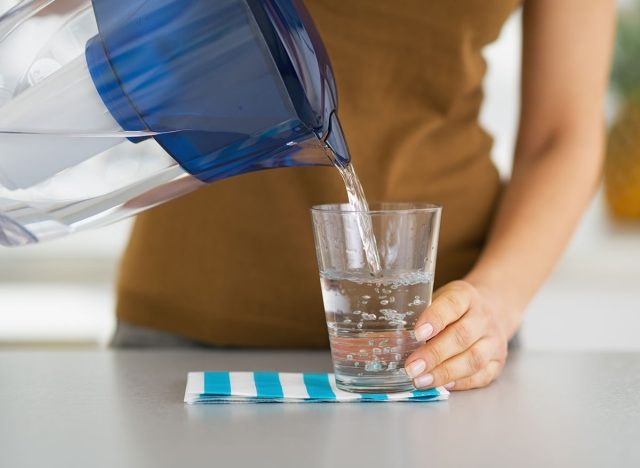Drink This Much Water Each Day To Prevent Heart Failure, New Study Says

Drink up that H2O on the daily, because keeping yourself hydrated can be extremely beneficial for your heart health. A new study recently published in the European Heart Journal reveals that not drinking enough water on the regular may put you at risk of developing chronic heart issues down the road. So, you may find yourself wondering if you’re drinking enough water each day to support your heart health. Grab your favorite bottled water, drink up, and listen up, because we’re going to dive into this below. Read on to learn more about how much water you should drink daily in order to prevent heart failure. And next, be sure to check out The 6 Best Exercises for Strong and Toned Arms in 2022, Trainer Says.
The facts on staying hydrated and your heart health

We know that the entire human body thrives on water—it needs to stay hydrated in order to function properly. In fact, according to Natalia Dmitrieva, Ph.D., the lead author of the study and researcher in the Laboratory of Cardiovascular Regenerative Medicine at the National Heart, Lung, and Blood Institute (NHLBI), part of NIH explains, “Similar to reducing salt intake, drinking enough water and staying hydrated are ways to support our hearts and may help reduce long-term risks for heart disease.”
Over 6.2 million Americans experience heart failure. Heart failure happens when your heart stops pumping a sufficient amount of blood throughout your body. This chronic condition is more common for individuals 65 years of age and older, and drinking water to keep hydrated is of major importance to ensure everything is running smoothly (via Science Daily).
Related: Over 40? Quit These 5 Bad Habits For Better Heart Health, Expert Says
Here’s how the new study went down

Dmitrieva and a team of researchers started with “preclinical research” that revealed links between the hardening of heart muscles (cardiac fibrosis) and dehydration, followed by an analysis of existing data of over 15,000 individuals aged 45 to 66. The people in the data had participated in a two-year Atherosclerosis Risk in Communities (ARIC) study, coupled with 25 years of health examinations.
The most recent study was limited to observing those individuals who have normal hydration levels. The 11,814 participants were not obese, and they did not have heart failure or diabetes when the recent study commenced. Of the adults observed, 1,366 (11.56% of them) eventually contracted heart failure.
The team’s assessment of the possible connection to hydration was gauged by observed serum sodium levels, which raise when one’s body becomes less hydrated. This was instrumental in detecting a participant’s higher risk for heart failure. It also assisted researchers in spotting older participants at a higher risk for left ventricular hypertrophy (which is the enlargement of the heart).
Related: The 3 Sneaky Ways Losing Belly Fat Helps Your Heart Health, MD Says
Middle-aged individuals with sodium levels higher than 142 are at risk for heart failure

The study found that middle-aged individuals with sodium levels higher than 142 are at risk for heart failure as they age. The research also determined that staying hydrated can potentially prevent a chain of events that can result in heart failure.
Manfred Boehm, M.D., leader of the Laboratory of Cardiovascular Regenerative Medicine explains, “Serum sodium and fluid intake can easily be assessed in clinical exams and help doctors identify patients who may benefit from learning about ways to stay hydrated.”
This is how much water you should be drinking on the daily

Everyone’s body is different, but based on the study, 6 to 8 cups of water is recommended each day for women to be properly hydrated, and 8 to 12 cups of water is recommended daily for men. The right amount of hydration is essential to prevent the potential risk of heart failure.









